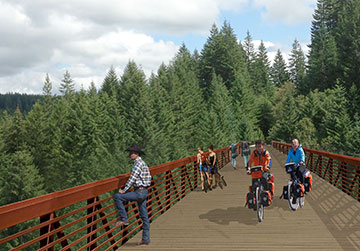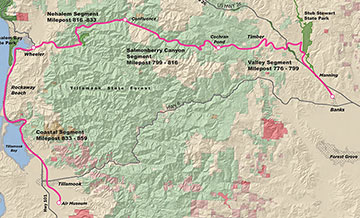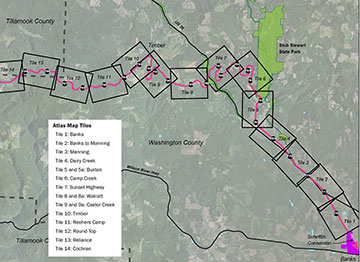 |
Previous Issues |
| Cedar Mill Community Website |
|
Search the Cedar Mill News: Search the Cedar Mill News
|
About The Cedar Mill News |
|
|||||||
| Volume 18, Issue 1 | January 2020 |
||||||
Washington County joins Salmonberry Trail group
|
||||||||
 |
| Conceptual drawing of a portion of the trail from the Concept Plan |
The Salmonberry Trail is currently in the initial stages of development, with a Concept Plan released in spring 2015. Making use of now-defunct portions of the Port of Tillamook Bay railroad corridor, a railroad line formerly owned by Southern Pacific that stretches between Willamette Valley and the Oregon Coast, the Salmonberry Trail is described as a “non-motorized, mixed-use recreation path” that will span a total of 86 miles. Beginning in flat farmland in and around Banks, the trail will weave through the Tillamook State Forest to Wheeler, a town north of Tillamook on the Oregon Coast, where the trail will then steer south through several coastal towns before terminating at the Tillamook Air Museum.
The trail is intended for use by walkers, bikers, and equestrians, as well as local hunters and fishers. In order to organize development of the trail, the Salmonberry Trail Intergovernmental Agency (STIA), a network of public and private interests involved in planning the trail, was established in 2015. Alongside the STIA, the Salmonberry Trail Foundation was established in November 2019 to raise funds for the project through grants and private donations.
 |
| The entire proposed route of the Salmonberry Trail. Click image to see larger map |
The STIA is tasked with working collaboratively to carry out and adjust the Concept Plan, apply for land-use permits, analyze the environmental and human impact of the Trail, and partake in a broad spectrum of planning and management aspects of the trail. The agency is headed by a Board of Directors, comprised of full voting members and various “ex-officio” parties. Voting members on the STIA Board of Directors include the Oregon Department of Forestry, the Oregon Parks and Recreation Department, Tillamook County, and the Port of Tillamook Bay.
Previously, Washington County was an ex-officio member of the STIA. As an ex-officio entity, the county consulted with other voting and non-voting parties connected to the STIA and played a significant advising role for the organization, but it did not have voting privileges on STIA’s Board of Directors.
The Board of Directors and Washington County reached an agreement this December to amend the STIA Intergovernmental Agreement and designate Washington County as a full-fledged voting member of its Board of Directors. At their December 17 meeting, the Washington County Board of County Commissioners deliberated and agreed upon the terms of the amendment, meaning Washington County will have a voting representative on the STIA Board of Directors by January 2020.
According to the 2015 Concept Plan drafted by the Salmonberry Coalition, an all-encompassing group of state governmental agencies, advisory councils, and city governments, Salmonberry Trail represents an opportunity to historically and environmentally preserve various historical sites, state parks, and recreation areas along the trail, while also economically “[revitalizing] communities along the rail corridor, including Banks, Timber and the small towns along the coast from Wheeler to Tillamook.” Moreover, Salmonberry Trail, much like the popular Banks-Vernonia trail, offers a potential economic and recreational bridge between urban areas within Willamette Valley and rural communities on the Oregon Coast.
 |
| The Washington County portion of the trail is called the Valley Segment |
While Washington County only has jurisdiction over a small portion of the Salmonberry Trail—the trail’s most eastern portion from Banks to the Tillamook County line—the costs associated with this portion are noteworthy. According to Washington County Counsel Alan Rappleyea, the “Valley” segment of the trail, the part that resides in Washington County, could cost anywhere from $23 to $77 million, depending on infrastructure and route decisions. Washington County’s decision to become a voting member of the STIA Board of Directors does not obligate it to expend any funds or administrative activities for the construction of the Salmonberry Trail.
The planning and development of Salmonberry Trail is divided into four parts: Valley, Coast, River, and Canyon. As of 2019, only Valley and Coast have a detailed Master Plan outlining their development. Potential funding for the River and Canyon portions of the trail has been identified via a grant from Tillamook County, said Washington County Commissioner Jerry Willey in a November 2019 memo to the BCC. As such, detailed plans for all four sections of the Salmonberry Trail may be complete by 2020.
Some potential hurdles as the project progresses include parts of the Port of Tillamook Bay rail corridor that have experienced damage, obstruction, and blockage due to various environmental factors, a particularly significant challenge in the Canyon segment. Additionally, there are efforts underway to coordinate the expansion of the Oregon Coast Scenic Railroad, the only active portion of the Port of Tillamook Bay rail corridor, with the construction of Salmonberry Trail.
Though it’s unclear when the trail will be available for public use, the Concept Plan suggests construction may finish in 2035. In comparison, the Banks-Vernonia trail, another multi-use trail connecting Washington County to rural Oregon, took 30 years from concept design to construction before becoming available to the public.
![]()
Like us on Facebook for timely updates
Published monthly by Cedar Mill News LLC
Publisher/Editor:Virginia Bruce
info@cedarmillnews.com
3270 NW Kinsley Terrace
Portland, Oregon 97229
© 2020